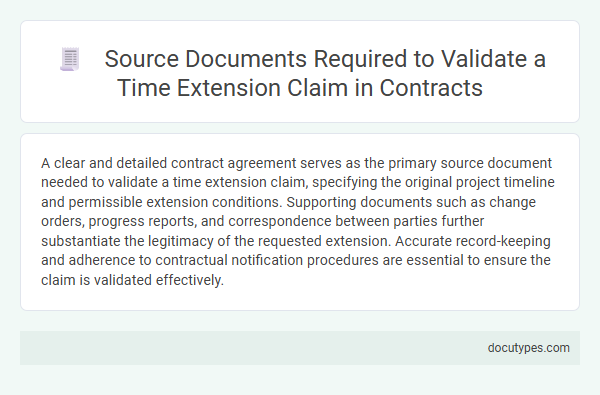A clear and detailed contract agreement serves as the primary source document needed to validate a time extension claim, specifying the original project timeline and permissible extension conditions. Supporting documents such as change orders, progress reports, and correspondence between parties further substantiate the legitimacy of the requested extension. Accurate record-keeping and adherence to contractual notification procedures are essential to ensure the claim is validated effectively.
Introduction to Time Extension Claims in Contracts
Time extension claims are critical in contract management to address delays impacting project timelines. Understanding the documentation required to validate such claims ensures proper contract execution and dispute resolution.
Valid source documents establish the legitimacy of time extension requests, providing evidence to support claims. Accurate record-keeping and timely submission of these documents are essential to protect your contractual rights.
- Contract Agreement - Specifies the original project timeline and conditions under which extensions may be granted.
- Delay Notices - Formal communications documenting the occurrence and reasons for delays affecting the schedule.
- Time Impact Analysis - A detailed report quantifying how specific delays influence the overall project completion date.
Importance of Source Documents in Time Extension Validation
Source documents are crucial for validating a time extension claim in contract management. These documents include daily logs, progress reports, and correspondence that provide evidence of delays and their causes. You must ensure accurate and comprehensive source documentation to support your time extension requests effectively.
Notice of Delay Submission Records
To validate a time extension claim in a contract, the primary source document required is the Notice of Delay Submission Records. These records serve as official evidence detailing the occurrence and cause of the delay, ensuring compliance with contract terms. You must maintain accurate and timely submission of these notices to support any request for an extension.
Updated Project Schedules and Critical Path Analyses
To validate a time extension claim, updated project schedules serve as essential source documents, reflecting revised timelines and progress adjustments. These schedules provide documented evidence of delays and the impact on the overall project completion date.
Critical Path Analyses complement updated schedules by identifying affected tasks that directly influence the project's finish date. Together, these documents establish a clear, factual basis for assessing and approving time extension claims.
Correspondence Between Parties Regarding Delays
To validate a time extension claim in a contract, correspondence between the involved parties regarding delays is essential. These documents provide evidence of communication and acknowledgment of delay issues affecting the project timeline.
Such correspondence typically includes emails, letters, meeting minutes, and official notifications that outline the reasons for the delay and any agreed adjustments to the schedule. Maintaining a clear and documented exchange ensures transparency and supports the legitimacy of the time extension request. Courts or dispute resolution bodies often rely on this documented communication to assess the validity of claims and determine appropriate remedies.
Daily Progress Reports and Site Diaries
To validate a time extension claim in construction contracts, specific source documents are essential for accurate verification. Daily Progress Reports and Site Diaries serve as primary evidence to support the legitimacy of such claims.
- Daily Progress Reports - Detailed daily logs recording work completed, delays encountered, and resource allocations crucial for tracking project timelines.
- Site Diaries - Comprehensive daily records maintained by site supervisors capturing on-site activities, weather conditions, and unforeseen events impacting progress.
- Correlation Accuracy - Both documents must align to substantiate the cause and duration of delays, providing a factual basis for approving time extensions.
Change Order Requests and Approvals
Change Order Requests serve as the primary source document needed to validate a time extension claim in contract management. These requests must detail the reasons for delay and the specific adjustments required to the project timeline.
Approvals of Change Order Requests provide formal authorization that supports the legitimacy of the time extension claim. Your time extension claim is strengthened when both the request and its approval are thoroughly documented and aligned with contract terms.
Weather Reports and Third-Party Disruption Evidence
What source document is needed to validate a time extension claim related to weather and third-party disruptions?
Accurate weather reports are essential to verify delays caused by adverse weather conditions, providing objective data on rainfall, wind, or storms. Third-party disruption evidence, such as official notices or correspondence from utility companies or subcontractors, supports claims related to interruptions beyond the contractor's control.
Minutes of Meetings Addressing Project Delays
| Source Document | Purpose | Key Details |
|---|---|---|
| Minutes of Meetings Addressing Project Delays | Validate a time extension claim by providing official evidence of discussions and decisions related to project delays |
|
To support Your time extension claim effectively, ensure the minutes are detailed, accurate, and formally recorded as part of the project documentation.
What Source Document Is Needed to Validate a Time Extension Claim? Infographic

